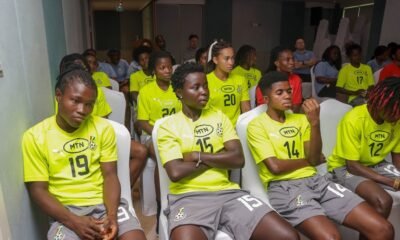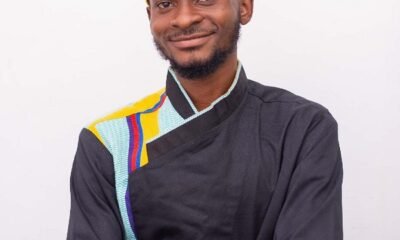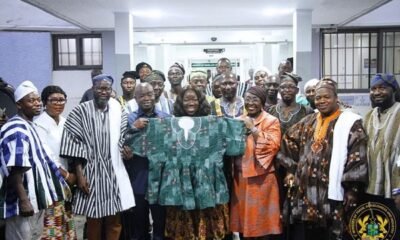News
IBEC-2025: RMU Ag. VC calls for innovative, inclusive strategies to accelerate Blue Economy growth

The Acting Vice Chancellor of the Regional Maritime University (RMU), Dr. Jethro W. Brooks Jr., has called for broader engagement among stakeholders within the sub-region to fully harness the potential of the blue economy.
Speaking at the opening ceremony of the second International Blue Economy Conference (IBEC-2025) currently underway in the Republic of The Gambia, he emphasised the need for industry players to be innovative and collaborate effectively to capitalise on opportunities within the ocean.
The three-day conference, which began on Wednesday, February 19, and is scheduled to conclude today, Friday, February 21, has brought together over 200 international stakeholders to exchange ideas on promoting the blue economy and fostering development across the continent by tapping into industry prospects.
The conference is being held under the auspices of the Ministry of Transport, Works, and Infrastructure of The Gambia, in collaboration with RMU in Accra and the Dar es Salaam Maritime Institute (DMI) in Tanzania.
Under the theme “Harnessing the Blue Economy: Leveraging for Innovative and Sustainable Development,” the conference has attracted high-profile delegates from the host country, The Gambia, as well as participants from Tanzania, Liberia, Sierra Leone, Nigeria, Ghana and other nations.
Among the dignitaries present were the Vice President of The Gambia, Muhammad B.S. Jallow, who officially opened the three-day event, the Gambian Minister for Transport, Works and Infrastructure, Mr. Ebrima Sillah, as well as several other Ministers of State.
In his remarks, the Ag. Vice Chancellor of RMU, Dr. Brooks Jr., stated that the blue economy focuses on leveraging oceanic resources to drive economic development while maintaining environmental sustainability.
“Our vision to utilise ocean resources for economic development in the sub-region can only be realized through innovation, collaboration and a commitment to sustainability,” he said.
While emphasising the importance of development through the blue economy, he also stressed the need for environmental sustainability.
“We must ensure that our development does not come at the expense of the environment. Therefore, we need to engage in practices that protect our water bodies, climate and the entire environment for future generations,” he added.
Dr. Brooks highlighted the critical role that RMU and other educational institutions must play in research and training for a sustainable future.
He also emphasised the importance of leveraging technology and innovation while prioritising the wellbeing of the ocean.
“A strong blue economy must ensure conservation, equity and inclusivity. It is vital to adopt a long-term approach that ensures the blue economy we develop today leaves a lasting legacy for tomorrow,” he stated.
“Let us come together to harness the potential of the blue economy for the benefit of the ocean, the people, and the climate,” he urged.
Dr. Brooks commended the organisers and sponsors for their efforts and expressed optimism for a brighter future with a focus on the blue economy.
Key presentations at the conference included topics such as the Blue Justice Approach to Blue Economy Policy Development and Implementation to Safeguard Small-Scale Fishers in Africa, Digital Transformation of the Blue Economy, Food Safety Concerns: A Priority in the Blue Economy, Aquaculture Innovation: Sustainable Practices for the Future of Seafood and Livelihoods, and Ocean Governance: Policy for Sustainable Blue Economy Development.
Additional topics included Climate Change Adaptation and Mitigation: Legal Instruments of Climate Change on Marine Environments and Coastal Communities, Ensuring Marine Safety and Security, and Sustainable Fisheries Management.
News
Man sentenced to 25 years for robbery at Manso Akwasiso

A 30-year-old man has been sentenced to 25 years imprisonment with hard labour by the Bekwai Circuit Court for his role in a 2022 robbery at a mining site at Manso Akwasiso in the Ashanti South Region.
The convict, Dominic Ofori, also known as Fanta, was arrested on 16th February 2026 after years on the run. He pleaded guilty before the Bekwai Circuit Court to robbery contrary to Section 149 of the Criminal Offences Act, 1960 Act 29, and was accordingly sentenced to 25 years imprisonment with hard labour.
On March 20, 2022, the Manso Adubia District Police received intelligence that a group of armed men from Manso Abodom were planning to attack a mining site at Manso Akwasiso to rob the owner of gold concentrate. Acting on the information, police mounted a coordinated operation and laid an ambush at the site.
At about 5:30 pm the same day, four-armed men arrived at the site, fired indiscriminately, and robbed the miners of their gold concentrate. The police team on surveillance intervened, resulting in an exchange of gunfire.
Three of the suspects, Abu Abubakar, Musah Latif, and Gideon Takyi, sustained gunshot wounds and were pronounced dead on arrival at St Martins Catholic Hospital at Agroyesum. Dominic Ofori escaped at the time but was later arrested and put before the court.
The Ashanti South Regional Police Command has assured the public of its continued commitment to combating violent crimes and bringing offenders to justice.
News
Ashanti police arrest man for publishing false news on TikTok

The Ashanti Regional Police Command has arrested 45-year-old Isaac Boafo, also known as “Duabo King,” for allegedly publishing false news intended to cause fear and panic.
Police said the arrest follows a viral TikTok video in which Boafo claimed that four officers at the Central Police Station in Kumasi engaged in inappropriate conduct with commercial sex workers during night patrols in Asafo.
Officers from the Police Intelligence Directorate (Ashanti Region) apprehended Boafo after receiving intelligence about the video.
During questioning, he admitted to creating the video to attract views and engagement online, and acknowledged that he could not prove the allegations.
Boafo also admitted making comments about the President of the Republic for content purposes and could not defend those statements.
He has been formally charged and is in detention as investigations continue.
The Ashanti Regional Police have warned the public against publishing or sharing false information on social media, noting that such acts can cause fear, panic, and damage reputations.
They said anyone found engaging in similar conduct will face legal action.
By: Jacob Aggrey














